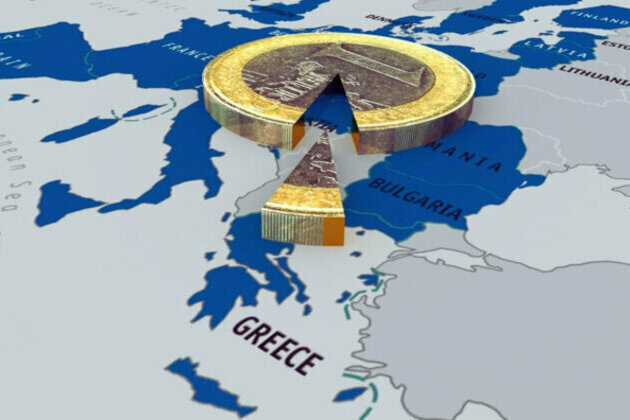Could Bulgaria Face a 'Greek Scenario' After Adopting the Euro
Novinite.com
17 Jun 2025, 12:40 GMT+10

With Bulgaria set to adopt the euro on January 1, 2026, questions are surfacing about whether the country might face financial risks similar to those that led to Greece's debt crisis. While comparisons are understandable, the differences in economic fundamentals and fiscal behavior between the two countries suggest that a repeat of the Greek scenario is unlikely - though not impossible if certain conditions are ignored.
What Happened in Greece
Greece's crisis was the result of long-standing fiscal mismanagement. For years, successive governments used the credibility gained by eurozone membership to borrow at low interest rates, using the funds to sustain extensive public spending. Rather than using the borrowed money for investment or reform, it largely funded generous social programs.
When the global financial crisis hit in 2008, Greece was left exposed. Economic activity contracted, especially in key sectors like tourism, and public debt ballooned. To make matters worse, Greece was caught manipulating its fiscal data, undermining trust with investors and EU partners.
Without the ability to devalue its currency - due to eurozone membership - and unable to access financial markets, Greece was forced to request a massive bailout from the EU, the European Central Bank (ECB), and the International Monetary Fund (IMF). This rescue package, amounting to ?240 billion, came with harsh austerity measures that plunged the country into years of recession. By 2015, Greek debt had climbed to ?315 billion, or 175% of GDP.
Why Bulgaria Is Not Greece
Bulgaria's fiscal policy over the past two decades has been consistently conservative. The country operates under a currency board pegging the lev to the euro, which has enforced financial discipline. Public debt currently stands below 30% of GDP - well beneath the eurozone threshold of 60%.
The upcoming euro adoption will remove the currency board but replace it with access to eurozone financial mechanisms and lower-cost borrowing on international markets. However, this does not mean Bulgaria is set to repeat Greece's mistakes.
The key difference lies in Bulgaria's low debt levels, stable macroeconomic indicators, and the lessons learned from the Greek crisis. Moreover, eurozone oversight has strengthened significantly since 2010. Mechanisms for early warning and fiscal monitoring now make it more difficult for countries to hide debt or misrepresent data.
What Could Still Go Wrong
While the fundamentals are currently sound, risks remain. Political instability in Bulgaria, evident in frequent elections and shifting coalitions, could lead to poor fiscal decisions in the future. If government spending increases sharply or if borrowing is used irresponsibly, debt levels could rise quickly.
Another challenge could come from implementation delays or missteps during the transition to the euro - especially regarding communication with small businesses and regulatory updates, such as aligning fiscal software and labeling prices in both currencies.
There are also broader concerns about corruption and the shadow economy. These structural problems do not automatically lead to a crisis but can erode institutional trust and economic efficiency, making the country more vulnerable during global downturns.
Conclusion
The so-called "Greek scenario" is theoretically possible in any country that loses fiscal discipline. However, Bulgaria is starting from a far stronger position than Greece did in the early 2000s. The country has maintained low debt, follows eurozone entry criteria closely, and benefits from stronger EU-level oversight than existed in Greece's time.
Ultimately, whether Bulgaria maintains its stability will depend on domestic policy choices. The euro cannot guarantee fiscal responsibility - it can only create a framework. It will be up to Bulgarian policymakers to operate within it wisely. The risk of crisis is not built into the euro itself, but into how governments choose to use the tools available to them.
 Share
Share
 Tweet
Tweet
 Share
Share
 Flip
Flip
 Email
Email
Watch latest videos
Subscribe and Follow
Get a daily dose of Greek Herald news through our daily email, its complimentary and keeps you fully up to date with world and business news as well.
News RELEASES
Publish news of your business, community or sports group, personnel appointments, major event and more by submitting a news release to Greek Herald.
More InformationInternational Business
SectionFoxconn iPhone exports from India now mostly headed to the US
NEW DELHI, India: Amid mounting U.S.-China trade tensions, Apple has sharply increased iPhone shipments from India to the United States,...
US: China lags in AI chips, but catching up fast
WASHINGTON, D.C.: The U.S. government estimates that Huawei will only be able to manufacture up to 200,000 advanced AI chips next year—well...
Ryanair CEO gets maximum bonus as Ryanair profits soar
DUBLIN, Ireland: Ryanair chief executive Michael O'Leary received a total pay package of 3.83 million euros for the financial year,...
PM Modi joins world leaders for group photo at 51st G7 Summit in Kananaskis
Kananaskis [Canada], June 18 (ANI): Prime Minister Narendra Modi joined world leaders for a group photograph at the 51st G7 Summit...
83 Air India wide-body flights cancelled between June 12 to 17: DGCA
New Delhi [India], June 17 (ANI): A total of 83 flights in Air India's wide-body operations were cancelled, out of which 66 were Boeing...
Air India's Bengaluru-London flight cancelled due to aircraft unavailability
New Delhi [India], June 17 (ANI): Air India on Tuesday said that its flight from Bengaluru to London's Heathrow was cancelled on Tuesday...
Mediterranean
SectionDebt fears drive fund outflows from US, inflows to Europe
NEW YORK CITY, New York: Investor confidence in U.S. markets is showing signs of strain as global funds redirect billions toward Europe...
Former student kills 9, then himself, in Austrian school
GRAZ, Austria: Austria is reeling after a tragic school shooting in Graz that left ten people dead, including the gunman, and 12 others...
PM Modi joins world leaders for group photo at 51st G7 Summit in Kananaskis
Kananaskis [Canada], June 18 (ANI): Prime Minister Narendra Modi joined world leaders for a group photograph at the 51st G7 Summit...
Deadliest Day Yet: Israeli Fire Kills Dozens in Gaza Aid Line
At least 59 Palestinians were killed and more than 200 injured on Tuesday after Israeli tanks opened fire on crowds in Khan Younis,...
PM Modi meets world leaders on sidelines of G7 Summit in Kananaskis; discusses bilateral cooperation, global issues
Kananaskis [Canada], June 18 (ANI): Prime Minister Narendra Modi engaged in a flurry of high-level bilateral meetings with leaders...
PM Modi meets Mexico, South Korea leaders on G7 sidelines in Canada
Kananaskis [Canada], June 18 (ANI): Prime Minister Narendra Modi held separate pull-aside meetings with Mexican President Claudia Sheinbaum...












